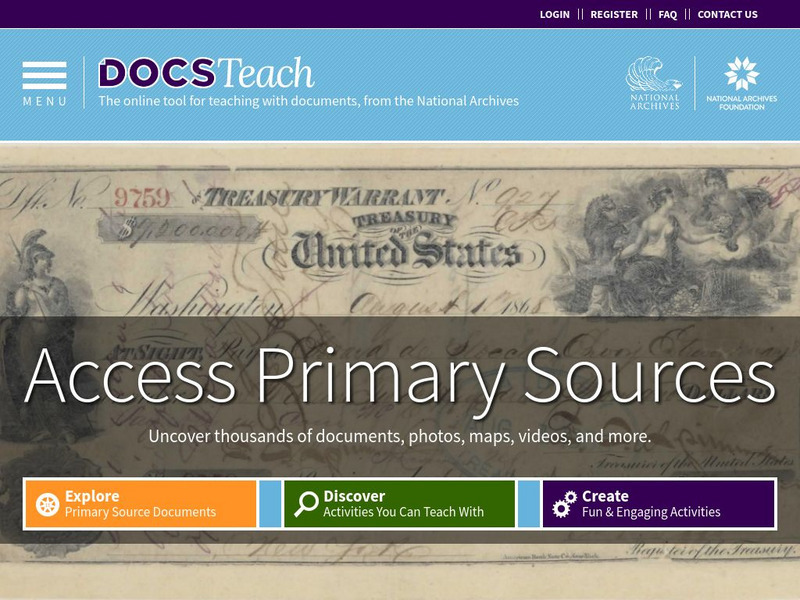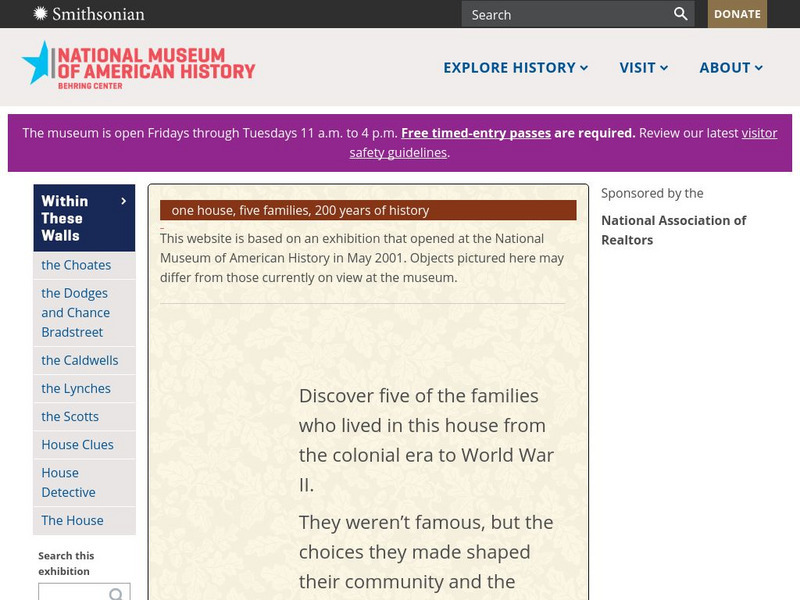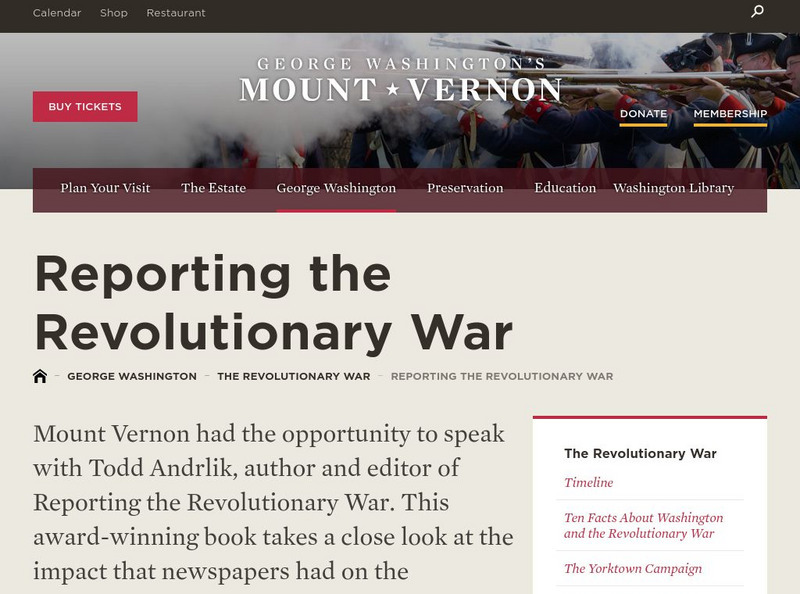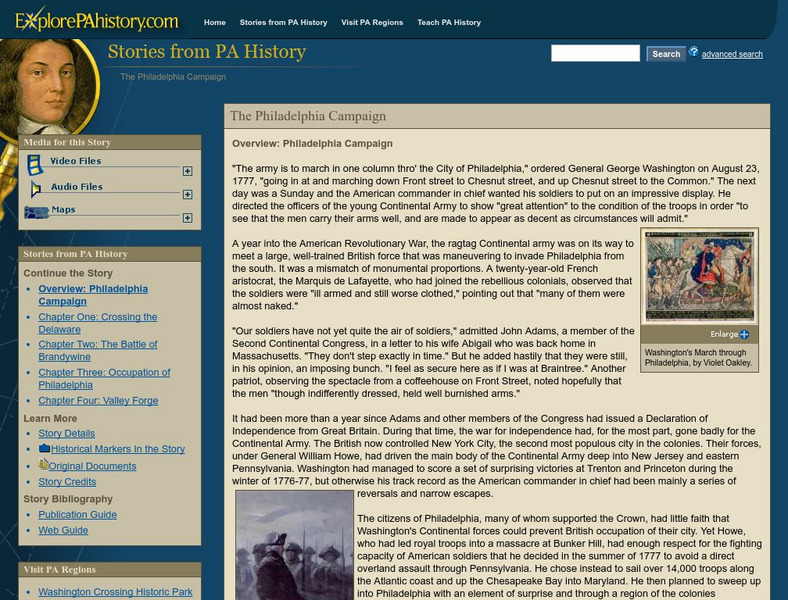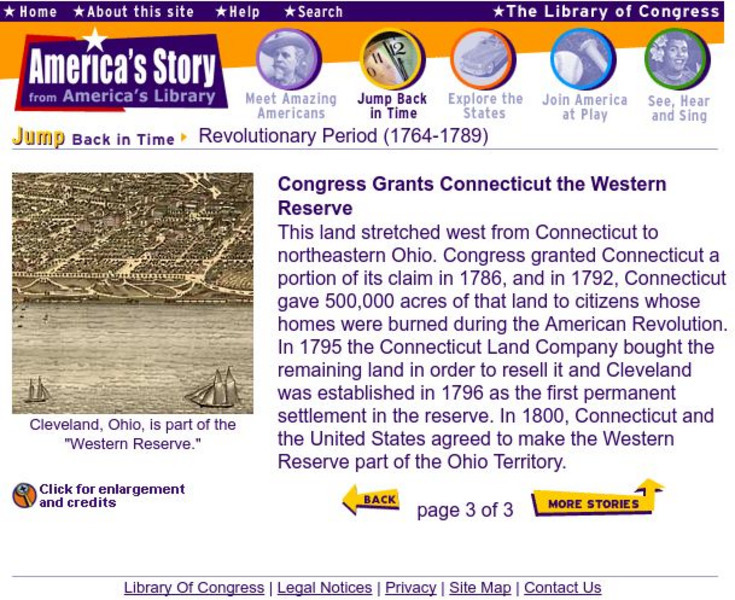US National Archives
National Archives: Bring History to Life
How can you actually bring history to life? Here are some tools from the National Archives that allow students to create their own projects using primary-source based activities that develop historical thinking skills. Special historical...
Annenberg Foundation
Annenberg Learner: America's History in the Making: The New Nation
After the War of Independence, Americans were unable to agree on the form of their federal government. This unit explores how those conflicts played out as the new Republic defined its identity in relation to other nations.
Smithsonian Institution
National Museum of American History: Within These Walls
If these walls could talk! Explore American History through one house that has experienced over 200 years of history. This interactive site has pictures of artifacts, primary sources, and music from 1757-1945. Be a detective and guess...
Huntington Library
Huntington Library: Six Important People From Our Nation's History
In this lesson, 5th graders examine the lives of six people who were important in early American history. They include Abigail and John Adams, Benjamin Franklin, Thomas Jefferson, Thomas Paine, and George Washington. Readings include...
Other
Mount Vernon Ladies' Association: Reporting the Revolutionary War
In today's fast-paced news cycle, we have multiple venues for learning about current events at any time during the day or night. During the revolution, they had one source (newspaper) that was only published once a week. Even with this...
A&E Television
History.com: How Alexander Hamilton's Men Surprised the Enemy at the Battle of Yorktown
Hamilton's leadership in the war's last major land battle would deliver the future Secretary of the Treasury his long-sought glory. Alexander Hamilton, the first Secretary of the Treasury, known for his famous, fatal duel with Aaron Burr...
Pennsylvania Historical and Museum Comission
Explore Pa History: The Philadelphia Campaign Brandywine
Learn about the people and events surrounding the Battle of Brandywine in this detailed account of Pennsylvania history. Included in this site are links to audio and pictorial images of this era.
Other
Indiana Historical Bureau: George Rogers Clark: 225th Anniversary Exhibit
Through this extensive exhibit, learn about the War in the West during the Revolutionary War, George Rogers Clark's part in the campaign, and why his success was so important. Much of the information is from Clark's journals.
Other
American Revolution: A Naval History of the American Revolution
This online reproduction of the original 1913 text by Gardner W. Allen is organized chronologically beginning in 1775 and ending with 1783. An appendix includes source citations, a list of vessels, officers, privateers and other...
Internet History Sourcebooks Project
Fordham University: Modern History Sourcebook: Thomas Paine
The complete original text of Thomas Paine's "Common Sense" originally published in January 1776.
A&E Television
History.com: Why Did Benedict Arnold Betray America?
Historians offer up many explanations, including that the Revolutionary War general may have had some self-esteem issues as a child and young man. Benedict Arnold was once a patriotic war hero valued by George Washington and admired by...
Other
Sons of the American Revolution: Revolutionary War: Major General John Stark
A biography of New Hampshire native Major General John Stark.
Travel Document Systems
Tds: Belarus: History
A brief but informative look at the history of Belarus. Find out what Revolutionary War hero was born there. Information is from the U.S. State Dept. Background Notes.
US Army Center
U.s. Army Center of Military History: Rufus King
A good biographical sketch of Rufus King, one of the signers of the Constitution. He was a delegate from Massachusetts. He served in the Revolutionary war and was later a senator from New York.
Khan Academy
Khan Academy: Us History: 1754 1800: The Constitutional Convention
Shortly after the end of the Revolutionary War, American leaders realized that the nation needed a new, stronger Constitution. But what would the new system of government look like?
A&E Television
History.com: What Did the Three Continental Congresses Do?
During the Revolutionary War, the Continental Congress became America's de facto government. Over a period of 15 years, from 1774 to 1789, the Continental Congress underwent a profound evolution. Starting out as a temporary group that...
Library of Congress
Loc: The Western Reserve Is Granted to Conn.
A brief explanation of Connecticut's acquisition of the Western Territory. Provides several historical maps to provide a view of The United States as it appeared after the Revolutionary War.
Gilder Lehrman Institute of American History
Gilder Lehrman Institute: History Now: George Washington and the Newburgh Conspiracy, 1783
[Free Registration/Login Required] Discover how General George Washington handled the Newburgh Conspiracy which threatened his authority and civil authority just before the provisions of the Treaty of Paris, ending the Revolutionary War,...
University of Groningen
American History: Outlines: The British Move South
With the French now involved, the British stepped up their efforts in the southern colonies since they felt that most Southerners were Loyalists. A campaign began in late 1778, with the capture of Savannah, Georgia. Shortly thereafter,...
Other
Arlington National Cemetery: History of Arlington National Cemetery
The National Cemetery site gives information about the famous, and not-so-well-known people who are buried there: war heroes, presidents, chief justices, explorers, historical figures, etc.
University of Groningen
American History: Outlines: Building Unity
Outline of the U.S. and the quest for unity in the early 1800s. Article briefly chronicles events such as the War of 1812 as well as political and economic decisions that created a united America separate from Britain.
University of Groningen
American History: Outlines: Defeats and Victories
Although the Americans suffered severe setbacks for months after independence was declared, their tenacity and perseverance eventually paid off. During August 1776, in the Battle of Long Island in New York, Washington's position became...
University of Groningen
American History: Outlines: The Revolution Begins
Overview of the final events leading to military skirmishes between British soldiers and American militia leading to Second Continental Congress official declaration of war.
Tennessee History For Kids
Tennessee History for Kids: Kings Mountain
It was the most famous road trip and the most important victory in Tennessee history. During the American Revolution, a British commander named Patrick Ferguson led an army through South Carolina. Along the way, he sent a threatening...


